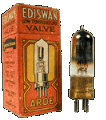Hikers Two by John Bauman, KB7NRN, Oregon, USA
|
|
Other
Hikers
Related Pages
|
Hikers article
Peter Lankshear's excellent history and background,
Hikers Two by John Bauman, KB7NRN, Oregon, USA,
Hikers Two (2 of) by Bill Meacham, Puerto Rico,
USA (check Bill's other sets at
www.sparkbench.com)
Hikers by Mike Peebles, Vancouver, WA,
USA (check Mikes site at
http://www.peeblesoriginals.com )
Winner of NZVRS Hikers comp. (that I was too lazy to
enter!), Well done to Bryan and runner up's
Seven quality scans
from 1936-1938 Popular Mechanics of the flashlight battery series of
regens that started it all, thanks to John Bauman |
|
Here is a nice little regen you can build in no time at all with the
advantage
of low voltage battery power for portable operation. The Hikerís series
of
regens, as found on www.oldradios.co.nz, are simple and fun to
build with
good performance. This page is dedicated to my first Hikerís regen, a
Hikerís Two
using 3Q5 tubes. I changed the circuit to suit the parts I had on hand,
details below.

Here you can see the layout. I cut a piece of 1/8Ē ABS sheet for the
panel then
arranged my parts on it. I then cut another piece of ABS for the bottom
panel.
ľĒ x 2Ē hex standoffs were used to connect the top and bottom panels, a
total of
eight standoffs were used. A template was made of panels indicating
component
location. Holes were drilled, components were mounted.

Assembly progressed well. One doesnít realize how much work is involved
building
a small receiver like this; there is much assembly, disassembly, drill,
cut and
reassembly. Parts placement is not all at once, at least not on this
radio, I
mount the main parts then figure where the other parts go, like audio
transformer, etc. . . Though, you could build this circuit in one
evening I took
my time in choosing parts and in building so it would have that vintage
look.
The philosophy here is: Build it stout. Build it to look good. Build to
perform
as good or better then it looks.

Now here is the fully assembled receiver. Audio transformer is tucked
behind the
dial just above the tuning cap. The transformer used in this project
wasnít made
for audio, itís a little power transformer with a secondary of 150vac @
50ma,
pretty small. I measured the resistance and inductance; found that it
was close
to an interstage audio transformer so I used it. Any interstage
transformer from
2:1 to 5:1 ratio should work fine. The coils I used (three total) were
from a
6SN7 regen I built a few years ago that became a parts donor for my
Regenerodyne
project.Frequency range with the coils on hand is from 2. 3 to 11
mhz. Will wind another coil for AM and 160 mtrs.
The regen is housed in an old Clapp / Eastham Radio Apparatus case I
found at
swap meet for $5.00. Itís solid oak.

I modified the circuit a little, the cap in the feedback circuit was put
in
series with the wiper on the regen pot and increased from 100 to 400uuf,
the
polarity of the A battery was reversed because there was too much gain.
. . .
Yep, thatís right, too much gain. I could power a vintage speaker horn
to room
filling volume. Now I can use the headphones with the battery reversed.
This
seems to change the bias of the tubes.

So here is proof that this simple little radio works. Give it a try;
even a one
tube version should work very well. If you can find some #49 tubes you
only need
one 9 volt battery for B+, makes it compete with those sand state
portable radios.
Good Providence, John KB7NRN
 |
|
Return to Hikers Main Page |
|
 Main
Menu[
Home |
©redits
|
Search
| Promote
|
Links
|
Guest
Book |
What's New?
]
Main
Menu[
Home |
©redits
|
Search
| Promote
|
Links
|
Guest
Book |
What's New?
]
















